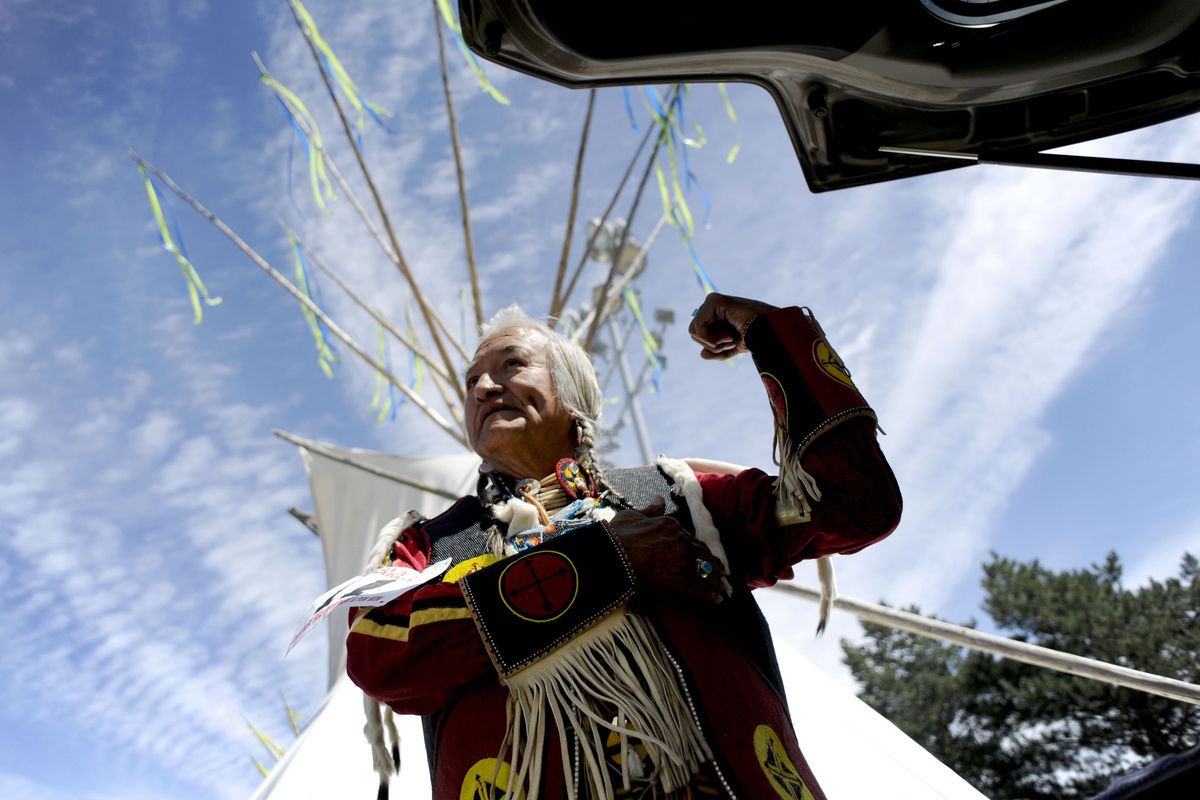Julyamsh Powwow honors pair of departed legends

Beneath orange strands of fabric representing the Hopi tribe wafting in the breeze Saturday morning, Billy McDermitt sat among Native American friends and gestured to the pine branches supporting his teepee lodge.
“These represent the different churches of the world,” he explained. “All of our prayers, they’re tied up at the top.” According to traditional beliefs, a visitor leaving the lodge is absolved of their sins, he said.
McDermitt, a Hopi from southern Nevada, was just one of the far-flung tribal members who gathered this weekend for Julyamsh, the midsummer event billed as the largest powwow in the Northwest and hosted by the Coeur d’Alene Tribe for the past 18 years. The four-day celebration brings together tribal cultures from throughout the United States for song, dance, traditional parades and storytelling.
Providing the acoustic accompaniment Saturday were 55 drum groups, including mainstays the Black Lodge Singers, who have been nominated for Grammy Awards. Rose Creek, a band of 10 or so female Coeur d’Alene Tribe members, offered more local fare.
First-time Julyamsh performer Hunter Blassingame, 23, has been singing competitively for more than a decade. He played the hand drum Saturday morning with two family members as part of the group Bullhorn, named for the elk skins pulled taut that produce the group’s signature sound. His black hair pulled back in a ponytail and tied with a navy blue bandanna, the Northern Cheyenne Tribe member said Julyamsh was one of the largest competitions he has seen.
“It’s humbling, it’s really humbling,” Blassingame said of the competition. For the top circle drum group, $15,000 was on the line. But the violent strikes of the drum took a back seat to the visual display later Saturday with the traditional horse parade and Grand Entry, when the powwow’s estimated 800 dancers took the field in full tribal regalia.
The parade bore a new moniker this year, named after Julyamsh champion Clifford SiJohn, of the Coeur d’Alene Tribe. He and Spokane Tribe member George Flett, both stalwarts of previous Julyamsh powwows, died in the past year. SiJohn’s son, Francis “Frenchy” SiJohn, said it was important to his father for the tribe and family to keep the celebration going.
“That first horse parade that came out, it was pretty tough for our family, my sister and my brother,” said Francis SiJohn, who is judging this year’s parade in his father’s stead. The event carries a special significance for the SiJohns. An ancestor was killed in the Battle of Steptoe, a Native American victory over U.S. Army forces in May 1858 that prompted a retaliatory horse slaughter ordered by U.S. Col. George Wright.
A memorial horse tail dance, the same style that Cliff SiJohn performed for decades to remember the slain horses “who screamed like children for their mothers,” according to one storyteller, was planned for Saturday night, Frenchy SiJohn said.
Ike BlackWolf, a visitor from the Yakama and Warm Springs tribes at Julyamsh for nearly a decade, rode his 29-year-old Appaloosa horse, Dr. Spots, in young warrior regalia during the parade. Clad in a buckskin breech-cloth and traditional warrior braids, BlackWolf said his horse was getting too used to the crowds after riding in the parade so long.
“I think he was showing off a bit,” he said, leading Dr. Spots to stable with a laugh.
The parade was shortly followed by the Grand Entry, a drum-assisted successor to what was once called a victory dance. Tribe members young and old were led on a serpentine path through the main field, stepping in time to the beat of the circle drums and shaking bells sewn to their outfits as the musicians sang in native tongues.
Frenchy SiJohn said the celebration embodied in the Julyamsh Powwow brings the memory of his father back fresh in his mind.
“He’s obviously missed; he’s not here with us,” SiJohn said of his father. “But spiritually, you know that he’s here.”